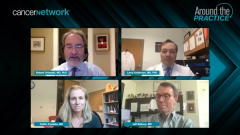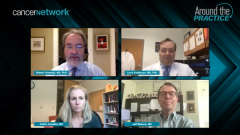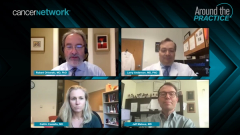
Counseling Patients With MM About Treatment Duration
Recommendations when talking with patients with transplant-ineligible multiple myeloma (MM) who request to stop receiving treatment.
Episodes in this series

Robert Orlowski, MD, PhD: Let’s take on a discussion that I sometimes have to have with my patients, especially in this transplant-ineligible category. Let’s take this patient that we’ve been discussing and assume that the patient gets 6 months of therapy with dara/len/dex [daratumumab, lenalidomide, dexamethasone], achieves a VGPR [very good partial response], tolerates the regimen well, but still decides they want to stop therapy and asks for your opinion. My understanding is that this is not atypical, that often after 5 to 6 cycles, people want to try to stop, which is a shame of specialists in starting with the 7th month. You only do the dara [daratumumab] once per month. For the panel, how do you handle this discussion? What are the main talking points that you use in having this discussion with patients? Caitlin, let’s start with you.
Caitlin Costello, MD: It is a discussion to understand what the thought behind wanting to stop it is. This case says it was tolerated well, but is the patient wanting to travel? Is the patient having trouble with diarrhea related to lenalidomide? Is the patient tired of seeing my face? What is it and how can I negotiate? We know we want patients to stay on therapy as long as possible, so if there’s any little tweaks—I know I also don’t like to tweak a lot—but I do prefer them to stay on treatment. If I can lower the lenalidomide dose or even push out a daratumumab dose so they can go on a vacation—whatever it is. I always say I want to interfere with your life as little as possible. If this marathon is what we’re running together, how can we make it so that the drugs are not worse than the disease? Because that is how it is on maintenance. Oftentimes their symptoms have improved and now they’re taking drugs and feel fine and wondering why they’re still taking drugs. It’s a discussion about how we can make it less bad to maintain compliance.
Robert Orlowski, MD, PhD: Jeff, when you have these discussions, do you ever bring in data from the so-called “FIRST trial,” and if so, could you briefly mention what that is for those who may not keep up with the myeloma literature as much? It was, of course, not the first trial ever done in myeloma.
Jeff Matous, MD: I do use data and I will go to the computer and show patients—and trying to explain Kaplan-Meier curves is a whole different discussion to patients—but I say, “Hey, the old way we treated myeloma is you treat for a while, and you stopped. We’ve learned time and time again that longer treatment is better than shorter treatment.” I tell them that in general, but exploring all the things Caitlin suggested. If you look at the FIRST trial, it was an informative trial with 1500 or 1700 patients. The 3 are randomization, rev/dex [lenalidomide, dexamethasone] continuous, rev/dex for 9 months, and VMP [bortezomib, melphalan, prednisone] for 9 months, were the 3 arms. Looking at progression, the Rd [lenalidomide, dexamethasone] arm for 9 months and the VMP arm for 9 months, they were overlapping for PFS [progression-free survival]. Naturally, the Rd continuous arm looked the best for PFS. Of course, you saw the curve split after 9 months. The issue was rev/dex should be the standard of care in these frailer patients.
The question I kept trying to ask and dig out through the FIRST trial—I could never find it, I don’t know if you guys ever found this out—is how long do those patients on the FIRST trial, who were on Rd continuous, stay on the dexamethasone? That’s what I want to know. That was a real-world question. I could not get that answer out of anybody. I don’t know if you guys know the answer to that.
Robert Orlowski, MD, PhD: I don’t know the answer. Larry? Caitlin?
Larry Anderson, MD, PhD: It was designed to stay on it, but I’m not sure if they really did or in what percentage of patients.
Jeff Matous, MD: Exactly. The Italians just published a cool study last month in Blood. I don’t know if you guys saw it. It was an Rd where they ditched the dex [dexamethasone]after 8 cycles and put people on rev [lenalidomide] maintenance. That looked good. That was a real-world study.
Transcript edited for clarity.
Newsletter
Stay up to date on recent advances in the multidisciplinary approach to cancer.










































